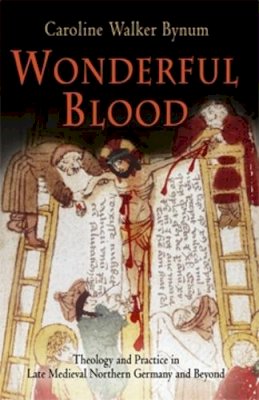13%OFF
Stock image for illustration purposes only - book cover, edition or condition may vary.
Wonderful Blood: Theology and Practice in Late Medieval Northern Germany and Beyond
Caroline Walker Bynum
FREE Delivery in Ireland
Description for Wonderful Blood: Theology and Practice in Late Medieval Northern Germany and Beyond
Paperback. Bynum argues that Christ's blood as both object and symbol was central to late medieval art, literature, and religious life. As cult object, blood provided a focus of theological debate about the nature of matter, body, and God and an occasion for Jewish persecution; as motif, blood became a central symbol in popular devotion. Series: The Middle Ages Series. Num Pages: 456 pages, 34 illus. BIC Classification: 1DFG; 3H; HRCV; HRLB. Category: (U) Tertiary Education (US: College). Dimension: 232 x 154 x 28. Weight in Grams: 758.
The quiet market town of Wilsnack in northeastern Germany is unfamiliar to most English-speakers and even to many modern Germans. Yet in the fifteenth century it was a European pilgrimage site surpassed in importance only by Rome and Santiago de Compostela. The goal of pilgrimage was three miraculous hosts, supposedly discovered in the charred remains of the village church several days after it had been torched by a marauding knight in August 1383. Although the church had been burned and the spot soaked with rain, the hosts were found intact and dry, with a drop of Christ's blood at the ... Read morecenter of each.
In Wonderful Blood, Caroline Walker Bynum studies the saving power attributed to Christ's blood at north German cult sites such as Wilsnack, the theological controversy such sites generated, and the hundreds of devotional paintings, poems, and prayers dedicated to Christ's wounds, scourging, and bloody crucifixion. She argues that Christ's blood as both object and symbol was central to late medieval art, literature, pious practice, and theology. As object of veneration, blood provided a focus of intense debate about the nature of matter, body, and God and an occasion for Jewish persecution; as motif, blood became a prominent subject of northern art and a central symbol in the visions of mystics and the prayers of ordinary people.
Show Less
Product Details
Publisher
University of Pennsylvania Press
Series
The Middle Ages Series
Place of Publication
Pennsylvania, United States
Shipping Time
Usually ships in 15 to 20 working days
About Caroline Walker Bynum
Caroline Walker Bynum is Professor of Medieval History at the Institute for Advanced Study in Princeton, New Jersey. Past president of both the American Historical Association and the Medieval Academy of America, she was a MacArthur Fellow from 1986 to 1991. She is the author of numerous books, including Metamorphosis and Identity, The Resurrection of the Body in Western Christianity, ... Read more200-1336, Fragmentation and Redemption: Essays on Gender and the Human Body in Medieval Religion, and Holy Feast and Holy Fast: The Religious Significance of Food to Medieval Women, and is the editor, with Paul Freedman, of Last Things: Eschatology and Apocalypse in the Middle Ages, also published by the University of Pennsylvania Press. Show Less
Reviews for Wonderful Blood: Theology and Practice in Late Medieval Northern Germany and Beyond
"Bynum's latest masterpiece."—Renaissance Quarterly "A wide-ranging exploration of the meaning of the macabre but ubiquitous 'blood piety' that loomed large in Western Christianity in the later Middle Ages."—New York Review of Books "For three decades now, Bynum has been pivotal in drawing the attention even of nonspecialists to some of the overlooked, sophisticated conceptions that late medieval piety developed of ... Read morepersonal identity, death, redemption, gender, asceticism, and the body. She now zooms in on and brilliantly illuminates the equally complex and equally crucial issue of blood. . . . Her empathy with medieval Christians has allowed her to put her finger on one of their key concerns, and Wonderful Blood should refocus the study of late medieval piety once more."—Times Literary Supplement "A work of deep scholarship. . . Bynum's erudite book poses the question, why blood? . . . There is no other scholar who is better prepared to answer that question."—Speculum Show Less

